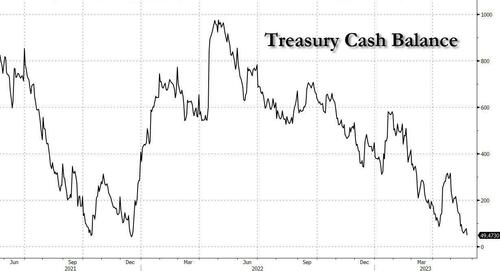
The White House and GOP negotiators have reached an agreement in principle to raise the US debt ceiling, averting a default.
The deal raises the debt limit and keeps non-defense spending 'near flat' for two years, while cutting and capping various federal programs, the NY Times reports. After 2025, however, there will be no budget caps.
Really?
— Elon Musk (@elonmusk) May 28, 2023
It was structured with the aim of enticing votes from both parties, though it would most likely draw the ire not only of conservative Republicans but also Democrats furious at being asked to vote for cuts they oppose with the threat of default looming.
If the progressives or the Freedom Caucus don't blow it up, the plan has a chance of Congressional passage before June 5, the date Treasury Secretary Janet Yellen has warned any deal must be finalized by in order to avoid hitting the "X-date", when the Treasury can no longer meet its obligations.
"After weeks of negotiations, we have come to an agreement in principle," said House Speaker Kevin McCarthy, adding that there are "historic reductions in spending" and "consequential reforms."
"There are no new taxes, no new government programs," McCarthy continued, adding that they would be spending tonight writing the agreement.
McCarthy expects a vote on Wednesday.
In the House, Republicans hold a narrow majority - meaning unhappy right-wing lawmakers who have demanded significantly larger budget cuts in exchange for raising the ceiling may hold it hostage (lookin' at you Gaetz).
Obligatory "What is this? A spending cut for ants!l" since nobody else did it pic.twitter.com/qXv88IHPDu
— ☠️ (@tradesly_io) May 28, 2023
That said, McCarthy can at least say he tried - inking in principle a compromise that would effectively freeze federal spending that had been slated to expand. McCarthy and Biden spoke by phone on Saturday to hammer out the final sticking points.
White House budget director Shalanda Young, senior adviser Steve Ricchetti, and legislative affairs director Louisa Terrell crafted the deal with Representatives Garret Graves, a Louisiana Republican, Patrick McHenry, a North Carolina Republican, and McCarthy’s chief of staff, Dan Meyer. -Bloomberg
The White House issued a Saturday night statement largely echoing McCarthy's - noting that the agreement "represents a compromise, which means not everyone gets what they want."
Needless to say, Democrats are not happy.
Wouldn’t it be nice if the White House told Dems at the same time what is going on? https://t.co/JATPnn7YXY
— Jared Moskowitz 🟧 (@JaredEMoskowitz) May 28, 2023
As we noted yesterday, a deal needed to materialize - and fast, as the Treasury's cash balance has dwindled dangerously low.
Putting this "deal" in context, the plan passed by the House GOP would reduce fiscal year ’24 spending by $130bn, or about 0.5% of GDP (setting aside the deficit saving from rescinding student debt forgiveness, which hasn’t been implemented yet and which may be struck down by the high court). At the other end, according to reports which indicate the White House may cap FY24 discretionary nondefense spending at FY23 levels would reduce spending by about 0.1% of GDP relative to a plausible baseline. So, the federal spending reduction for FY24 could range from 0.1% to 0.5% of GDP. The final "compromise" outcome - which may be announced as soon as Friday- will be a 0.2% spending cut.
* * *
Of course, this episode of can-kicking will be much like the next, and the next, until...
The White House and GOP negotiators have reached an agreement in principle to raise the US debt ceiling, averting a default.
The deal raises the debt limit and keeps non-defense spending ‘near flat’ for two years, while cutting and capping various federal programs, the NY Times reports. After 2025, however, there will be no budget caps.
Really?
— Elon Musk (@elonmusk) May 28, 2023
It was structured with the aim of enticing votes from both parties, though it would most likely draw the ire not only of conservative Republicans but also Democrats furious at being asked to vote for cuts they oppose with the threat of default looming.
If the progressives or the Freedom Caucus don’t blow it up, the plan has a chance of Congressional passage before June 5, the date Treasury Secretary Janet Yellen has warned any deal must be finalized by in order to avoid hitting the “X-date”, when the Treasury can no longer meet its obligations.
“After weeks of negotiations, we have come to an agreement in principle,” said House Speaker Kevin McCarthy, adding that there are “historic reductions in spending” and “consequential reforms.”
“There are no new taxes, no new government programs,” McCarthy continued, adding that they would be spending tonight writing the agreement.
McCarthy expects a vote on Wednesday.
[embedded content]
In the House, Republicans hold a narrow majority – meaning unhappy right-wing lawmakers who have demanded significantly larger budget cuts in exchange for raising the ceiling may hold it hostage (lookin’ at you Gaetz).
Obligatory “What is this? A spending cut for ants!l” since nobody else did it pic.twitter.com/qXv88IHPDu
— ☠️ (@tradesly_io) May 28, 2023
That said, McCarthy can at least say he tried – inking in principle a compromise that would effectively freeze federal spending that had been slated to expand. McCarthy and Biden spoke by phone on Saturday to hammer out the final sticking points.
White House budget director Shalanda Young, senior adviser Steve Ricchetti, and legislative affairs director Louisa Terrell crafted the deal with Representatives Garret Graves, a Louisiana Republican, Patrick McHenry, a North Carolina Republican, and McCarthy’s chief of staff, Dan Meyer. –Bloomberg
The White House issued a Saturday night statement largely echoing McCarthy’s – noting that the agreement “represents a compromise, which means not everyone gets what they want.”
Needless to say, Democrats are not happy.
Wouldn’t it be nice if the White House told Dems at the same time what is going on? https://t.co/JATPnn7YXY
— Jared Moskowitz 🟧 (@JaredEMoskowitz) May 28, 2023
As we noted yesterday, a deal needed to materialize – and fast, as the Treasury’s cash balance has dwindled dangerously low.
Putting this “deal” in context, the plan passed by the House GOP would reduce fiscal year ’24 spending by $130bn, or about 0.5% of GDP (setting aside the deficit saving from rescinding student debt forgiveness, which hasn’t been implemented yet and which may be struck down by the high court). At the other end, according to reports which indicate the White House may cap FY24 discretionary nondefense spending at FY23 levels would reduce spending by about 0.1% of GDP relative to a plausible baseline. So, the federal spending reduction for FY24 could range from 0.1% to 0.5% of GDP. The final “compromise” outcome – which may be announced as soon as Friday- will be a 0.2% spending cut.
* * *
Of course, this episode of can-kicking will be much like the next, and the next, until…
Loading…








